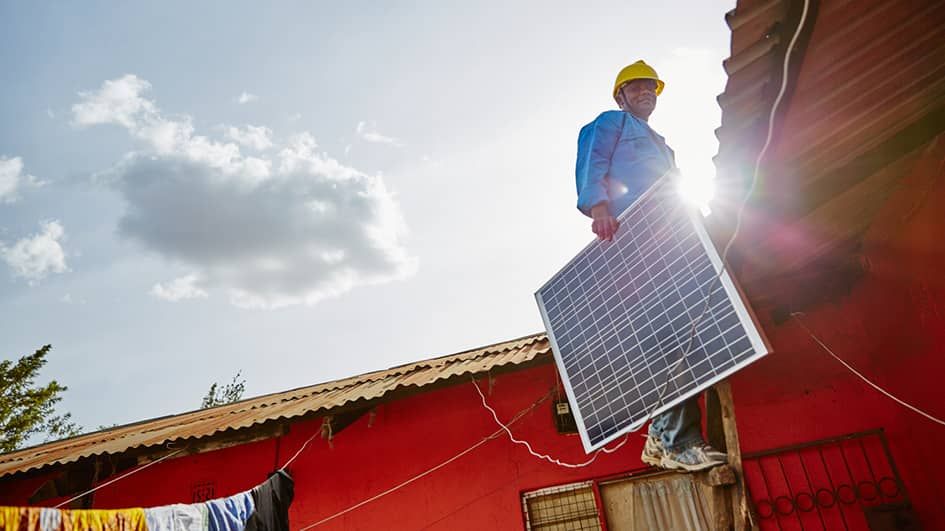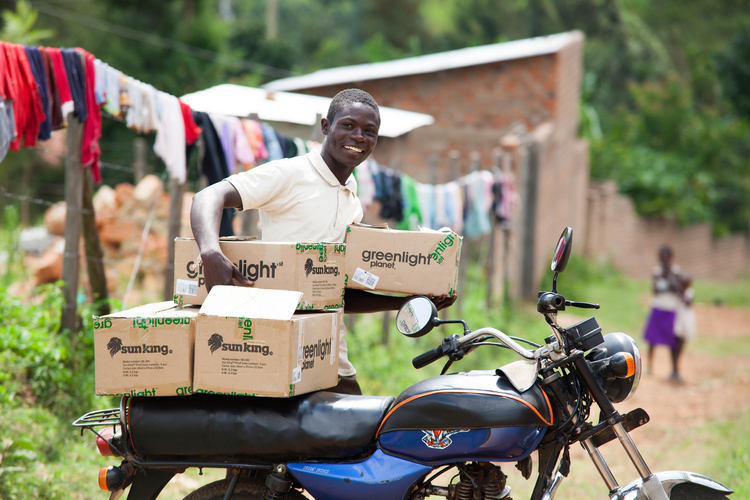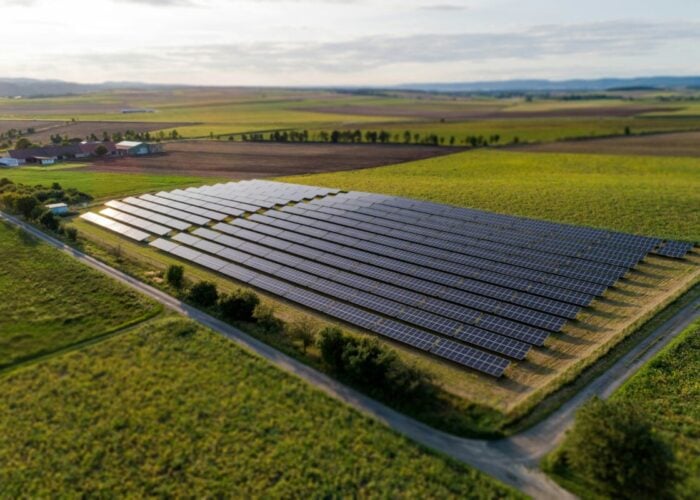
The distributed renewable energy (DRE) sector, necessary in a world with millions of people without power, is being held back by a chronic shortage of skilled workers. Indeed, Sub-Saharan Africa (excluding South Africa) has just 16,000 people working in renewable energy in a region with 600 million un-electrified people, according to the founders of a new campaign aiming to fill this skills gap.
A global coalition this week launched #PoweringJobs, a multi-year campaign aimed at creating the new energy skills and jobs needed to provide access to cheap, reliable, and clean energy for all. The coalition, backed by Schneider Electric Foundation and The Rockefeller Foundation, is made up of multilateral organizations, educational and training institutions, global energy companies, civil society groups, researchers and more.
Try Premium for just $1
- Full premium access for the first month at only $1
- Converts to an annual rate after 30 days unless cancelled
- Cancel anytime during the trial period
Premium Benefits
- Expert industry analysis and interviews
- Digital access to PV Tech Power journal
- Exclusive event discounts
Or get the full Premium subscription right away
Or continue reading this article for free
While demand is growing for home solar kits, mini-grids and energy-efficient appliances across rural Sub-Saharan Africa, Asia and Latin America, the campaign coordinator, Power for All, has said that there is also a growing shortage of job-ready talent. The dearth of skilled workers exists all across the DRE value chain, including manufacturing and assembly, sales, marketing and financing, and installation and services. It’s an especially big problem in remote, rural areas where lack of energy access gaps and joblessness are most severe.
A representative from UK-based off-grid solar specialist BBOXX, which has targeted many countries across Africa with its solar home system offering, told PV Tech that in-market competency shortages are among its main business challenges at present, by virtue of the locations in which BBOXX operates. (see Boxout below for market specific problems).
A Power For All spokesperson told PV Tech that Sub-Saharan Africa will be a key focus of the campaign given that this region has the biggest energy access gaps, the fewest trained workers and the biggest opportunity to use DRE to spur clean energy and new jobs, especially in rural areas.
He added: “The most immediate priority is pulling together better data on current employment in the DRE sector, job growth trends and where there are gaps, both geographically and in specific skill sets.
“A second key priority is identifying workforce training initiatives that are working in helping to propel distributed renewable energy efforts forward. India is a good example of this. India’s Skill Council for Green Jobs, launched as part of Prime Minister Modi’s massive national solar push, has already created 450 job training centres in seven states across the country and more than 30,000 solar PV installers have been certified.”
The International Renewable Energy Agency (IRENA) has also estimated that off-grid renewables for energy access could create at least 4.5 million jobs by 2030. However, Power For All told PV Tech that IRENA’s numbers could be conservative. The ILO has estimated that India alone could add 3 million new jobs if the renewable energy sector continues with its current growth trajectory.
Vocational training will become an essential part of the off-grid and decentralised energy revolution. For example, supported by the campaign, French energy management firm Schneider Electric has set a 2025 objective to train one million people in energy skills in countries where energy access is very low.
Kweku Yankson, global head of HR at BBOXX, said: “As we expand into new markets, a key potential constraint to our success is the quality of talent we find in these markets. This is particularly important in markets where local regulations limit the number of foreign/expat talent that companies are allowed to hire. We have a raft of solutions to this challenge, including competency development via the BBOXX Academy, job rotation via our mobile workforce programme (which allows us to rotate our pool of talent across different markets) etc.”
“#PoweringJobs will focus on ensuring that skills and training are at the center—not the margins—of international and national development policies related to energy access,” added Kristina Skierka, CEO of Power for All.
The campaign will conduct an annual energy access jobs survey to understand current employment, job growth trends, and to identify gaps in workforce formation. The survey will eventually provide a global picture of energy access jobs (direct, indirect and induced), and serve as a tool for attracting additional investment in skills building. The first findings will be released in H1 2019.
When asked what governments could do to alleviate the skills shortage, BBOXX's Yankson said: “Considering the importance of our sector to the achievement of national electrification and poverty-reduction goals (Togo being an example of the impact that businesses like ours can have on electrification at scale), we’d like governments to review, together with us, the core, in-market talent/capability gaps that stand in the way of rapid deployment of solutions for off-grid communities. We would like to see such a review lead to policies that aim to develop these capabilities in such a way as to make it more effective for companies in our sector to deploy and operate without some of the talent constraints that we’re currently facing. This will require a long-term commitment of resources, and a focused/data-driven approach.”
Kweku Yankson, global head of HR at UK-based off-grid solar specialist BBOXX explains market specific skills shortages in Sub-Saharan Africa:
- In our Rwanda market, for example, it has been challenging to find a host of key competencies at “job-ready” level. The most pressing challenge has been around finding very capable and experienced managing directors and senior finance managers. This is a function largely of the fact that Rwanda has few large multinational companies (MNCs) of the kind that typically train staff very well (and that, as a result, contribute to the building of large pools of job-ready talent in-market). Here our main rural area challenge has been in convincing talent to relocate from large cities such as Kigali and Musanze to rural areas to take up retail shop roles. To address this, we’ve put in place a number of incentives (e.g. relocation support and shop rotations) to make the transition to rural areas easier for staff.
- In Kenya, which is a much larger market with a very significant MNC representation (and a more mature educational system), it’s easier to find very capable talent at all levels. The main limitation we’ve faced in Kenya, however, has been the cost of talent; the very best talent in some parts of Kenya, particularly in Nairobi, tends to be very expensive, due largely to the fact that MNCs (e.g. Microsoft, Cisco etc) pay very well. NGOs also tend to pay very well across East Africa, which distorts the market pay rates quite a bit.
- In the parts of DR Congo from which we operate (e.g. Goma), we’ve had very significant challenges finding very capable talent, particularly at the senior management level (across most functional areas). While we have a strong team in place in DRC, the bulk of which comprises DRC citizens from the Goma area, we’ve had to invest significant amounts of time in training to bring our team to the level required to move the business forward.
- In Togo, where 100% of our team is local/Togolese, and where there is a decent MNC representation (e.g. Bollore etc), we haven’t had the kinds of talent acquisition challenges that we’ve had in markets like Rwanda.

Power For All Fact Sheet:
- 38 jobs are created in the solar-lighting industry for every 10,000 lights sold; this part of the sector alone could create 2 million jobs
- Bangladesh’s solar home system industry has already created 127,000 direct jobs, while India’s employs 72,000 people
- An additional 50-100% more jobs are created indirectly for each direct job in the decentralized renewables industry
- Reliable, affordable and rapidly available power from DRE boosts output for small to medium sized enterprises (SMEs); in Africa SMEs account for 80% of employment
- Mobisol estimates that 15,000 of its customers who use their systems for business create around US$5 million per year in additional income, while solar mills in Zambia are expected to create 3,000 jobs
- In India 70% of micro-businesses signed up to mini-grid services reported an increased number of customers, and 80% plan to expand their business because of access to reliable energy






